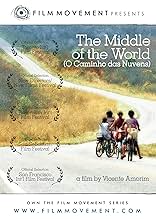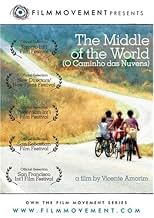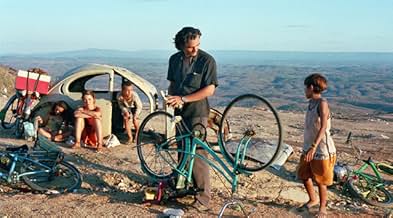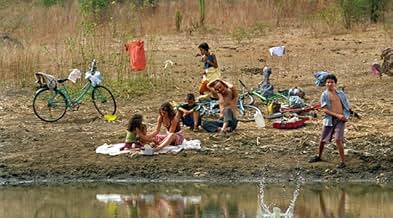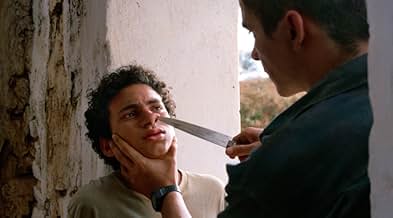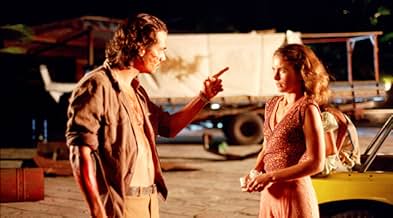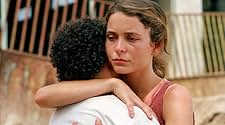IMDb RATING
6.5/10
1.3K
YOUR RATING
A man and his family travel 3200km (1984 miles) by bicycle, from the State of Paraíba to Rio de Janeiro, Brazil, in search of a job.A man and his family travel 3200km (1984 miles) by bicycle, from the State of Paraíba to Rio de Janeiro, Brazil, in search of a job.A man and his family travel 3200km (1984 miles) by bicycle, from the State of Paraíba to Rio de Janeiro, Brazil, in search of a job.
- Awards
- 1 win & 9 nominations total
Manoel Sebastião Alves Filho
- Rodney
- (as Manoel Sebastião)
Felipe Newton Silva Rodrigues
- Clévis
- (as Felipe Newton)
Cícera Cristina Almino de Lima
- Suelena
- (as Cristina de Lima)
Cícero Wesley A. Ferreira
- Cícero
- (as Cicero Wallyson e Ciceero Wesley)
Alexandre Zacchia
- Porfirio
- (as Alexandre Zachia)
- Director
- Writer
- All cast & crew
- Production, box office & more at IMDbPro
6.51.2K
1
2
3
4
5
6
7
8
9
10
Featured reviews
When being poor is not a big drama, it's life
May be the summary say it all but the movie it's so great that I'm gonna give interested people more info about it. Is the first time in the latinamerican movie history when a director make a movie about being poor is not a terrible drama, it's just life, nothing more and nothing less. You can watch how is it the Latin American way to live the poverty: It's a daily drama that everybody lives each day of their life and that make's life less dramatic. In the movie you can found a typical family and the play of each character are the same in every place in the world without differences of social class. In the film you can make a road-trip from the north to the south of Brazil but without the typical beach and sun scenery. No, here it is another part of Brazil, that part where the real people live and tourism don't show. Incredible characters and fantastic places.
10lexicon8
A magical and heart-warming voyage through the heart of Brazil.
I loved this movie!
It is so refreshing to watch a non-pretentious film that illustrates the realities of poverty and the search for happiness without making you want to jump out of the nearest window!
Normally, Latin American directors tend to emphasize and exoticize poverty-stricken towns and characters by dwelling on the families' strife and hardship in order to extract superficial emotion from the spectator. Mr. Amorim, however, deftly maneuvers around these themes with a sincere and compassionate and humanistic eye.
"O Caminho das Nuvens" is a funny and modern road-movie that takes you where you want to go...places you may have been before, but may not have seen in such a fresh and authentic way. Muito bom.
It is so refreshing to watch a non-pretentious film that illustrates the realities of poverty and the search for happiness without making you want to jump out of the nearest window!
Normally, Latin American directors tend to emphasize and exoticize poverty-stricken towns and characters by dwelling on the families' strife and hardship in order to extract superficial emotion from the spectator. Mr. Amorim, however, deftly maneuvers around these themes with a sincere and compassionate and humanistic eye.
"O Caminho das Nuvens" is a funny and modern road-movie that takes you where you want to go...places you may have been before, but may not have seen in such a fresh and authentic way. Muito bom.
A Great Brazilian Movie
A great Brazilian movie called "The Middle of the World", which, in fact, it is in so many ways. It is a rich but unpretentious chronicle of an extraordinary journey of one rural Brazilian family. The father is illiterate and unable to find work. Romão (the father), Rose(the mother), and their five children, from a teen to a baby, begin to make a journey on bicycles and head for Rio de Janeiro, which is 2,000 miles away, to find work. They face all kinds of physical and emotional hardships along the way, seeing many kinds of villages, dirt roads and superhighways, and desolate to spell binding scenes of nature. They beg, do odd jobs, sing in outdoor cafés for money, scrounge around in old abandoned homes, swelter under the blazing sun, almost die of thirst, and sleep under the stars; yet all the while, they keep trying to survive and maintain their love for each other, which is often tested beyond limits. The husband and wife relationship has classic features that are displayed poignantly and expertly. They exhibit a kind of yin and yang pattern with Romão being a strong, soft spoken, intensely patient, idealistic optimist and Rose being the one who verbalizes their feelings of love, sympathy, joy, as well as despair, fear, and anguish. She is also outspoken when their frailties have been overtaxed and when there is a need to be practical. Her pragmatism and his religious convictions balance each other out. Nevertheless, they are able to switch roles as the one to comfort, encourage, or recommit to the challenge when either has had enough and is losing hope and faith in their vision. With no competition from age-group peers, the character of their parents seems to be emulated as role models by the children. As a sub-plot, the teenager, Antonio, is in the middle of growing into manhood. The Father, Romão, exercises patient parental control through mild rebukes and testing Antonio's mettle by letting him use his judgment and make mistakes, but he also subtly guides him with silent looks of acknowledgement that builds Antonio's confidence in himself. Rose, the mother, gives equal guidance by emphasizing caution and protectiveness but also gives him a sense of profound mother-love that becomes his foundation of security. When the father senses Antonio is ready to emancipate, the mother does not want to let go and the father, in his wisdom-love, states simply and firmly to Rose, "We do not own our children." When Antonio is left behind to follow an occupation, the strong and positive family dynamic continues to the end of their journey. Finally, when at their destination of Rio de Janeiro, and expressing the powerful spirit of this family, their triumph is symbolized in a mountain top experience as they stand together viewing Corcovado's Statue of the Christ and overlook the prize of their victory, the city of their dreams. As they crossed the 2,000 miles of their courageous journey, they witnessed the many ways in which the nation they once knew is rapidly changing. It was a raw, earthy, beautiful story. It gave such a realistic picture of Brazil as a whole. It is a beautiful country but also has such vast differences between the rich and poor. The movie also showed what a big and truly dominant role religion, and religious superstitions, plays in the lives of the poor, illiterate 'peasants'. At 'The Middle of the World', two different worlds, the new cosmopolitan and the old world, stand on the same piece of earth!
Excellent
Wonderful movie that shows the lengths many poor people must go through to eke out a living. It shows the strong bond of family, strong bond of husband and wife.
The acting and cinematography was so well, I felt like I was along with them for the ride.
The movie opens up a world many of us never see- the everyday struggle of poverty, especially with family. What would you do to feed your family? I like the way the movie shows the conflict between pride and eating.
I applaud the excellent story telling done by the director, writer, and producer.
The acting and cinematography was so well, I felt like I was along with them for the ride.
The movie opens up a world many of us never see- the everyday struggle of poverty, especially with family. What would you do to feed your family? I like the way the movie shows the conflict between pride and eating.
I applaud the excellent story telling done by the director, writer, and producer.
10kridas
bicycle road movie of a poor famaily
it's the best road movie after Thelma and Louise. It's lovely in tempo, pictures, acting performance even of the very small kids, nice music, good mixture of action, drama, laughter, hope and despair, and getting out of your life the best possible....
Did you know
- TriviaCarol Castro's debut.
- ConnectionsReferenced in A Dona da História (2004)
Details
- Release date
- Country of origin
- Official site
- Languages
- Also known as
- The Path of the Clouds
- Filming locations
- Production companies
- See more company credits at IMDbPro
Box office
- Gross worldwide
- $13,278
- Runtime
- 1h 25m(85 min)
- Color
- Sound mix
- Aspect ratio
- 1.66 : 1
Contribute to this page
Suggest an edit or add missing content


